Unlock the power of streamlined asset management with QR Code Aluminium Asset Tags in Kenya. These durable tags bring together rugged aluminium materials and the versatility of QR codes, offering a smart, reliable way to manage assets with speed, precision, and real-time insights.
Data Analytics with QR Code Aluminium Asset Tags in Kenya.
Every scan of a QR code tag generates useful data. You can track asset usage, maintenance frequency, and lifecycle events. This analytical power allows organizations to optimize performance, reduce costs, and make data-backed decisions on asset planning.
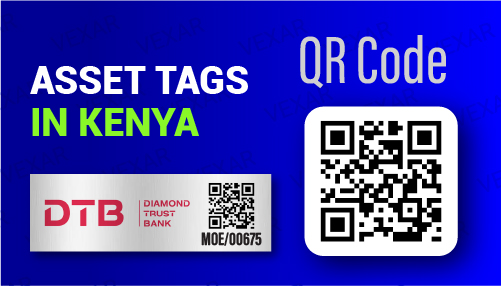
QR Code Asset Tags are Quick and Accurate Identification
With QR Code Asset Tags in Kenya, asset identification becomes instant and error-free. A simple scan via smartphone or tablet unlocks rich asset details—serial numbers, service history, warranty dates, and more—eliminating manual entries and reducing human errors.

QR Code Asset Tags are Smart Phone-Friendly
Our QR code asset tagging labels are fully compatible with mobile devices, allowing technicians and managers to retrieve or update asset data from anywhere. Whether in the office or on-site, you’ll have real-time access to accurate records—no need for spreadsheets or physical logs.

QR Code Asset Tags Streamline Maintenance & Repairs
QR code Asset tags can store maintenance schedules, repair instructions, and historical service logs. With QR Code Aluminium Asset Tags in Kenya, service teams can scan and instantly access essential documentation—speeding up repair cycles and reducing equipment downtime.
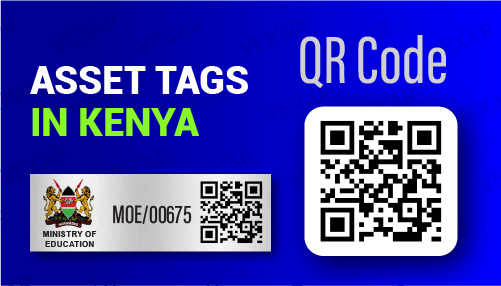
Barcode Aluminium Asset Tags with Tamper-Proof Design
Our asset tagging in Kenya includes advanced barcode aluminium tags—engineered for clarity, accuracy, and security. These tamper-evident tags are easy to scan, even after years of use. They are ideal for inventory audits, location tracking, and lifecycle monitoring in industries such as manufacturing, healthcare, logistics, and education.
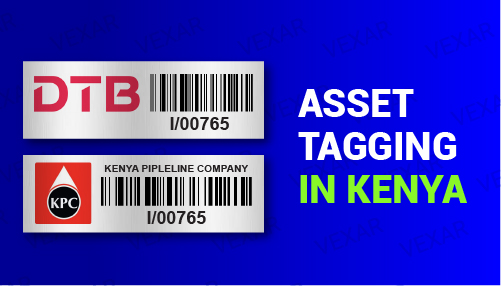
Why Asset Tagging Matters for Business Performance
Fixed asset tags are essential for maintaining an accurate asset register. They help identify and track the location, usage, and ownership of assets like vehicles, computers, and machinery. Effective asset tagging in Kenya improves asset lifecycle management, prevents theft, and reduces redundant purchases. To achieve this, it's critical to use the right tag for each asset type and apply it in a visible and secure position.

Custom-Made Aluminium Asset Tags, Designed for You
We understand that no two businesses are alike. That’s why we offer custom-made aluminium asset tags that reflect your brand and operational requirements. Whether you need a specific label shape, color code, or bilingual layout, we’ve got you covered. From large government projects to small business inventory systems, we deliver precision-tagging with fast turnaround and unmatched quality.
In today’s data-driven world, businesses are moving beyond basic barcoding to smarter, more dynamic solutions. QR Code Aluminium Asset Tags in Kenya are at the forefront of this transformation—providing a cost-effective, long-lasting way to identify, track, and manage assets across industries. The fusion of QR code technology with aluminium tags creates a future-ready solution that boosts operational efficiency and data visibility.
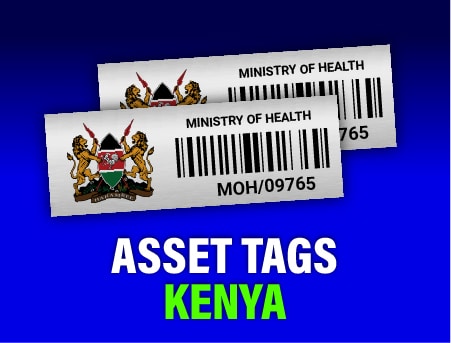
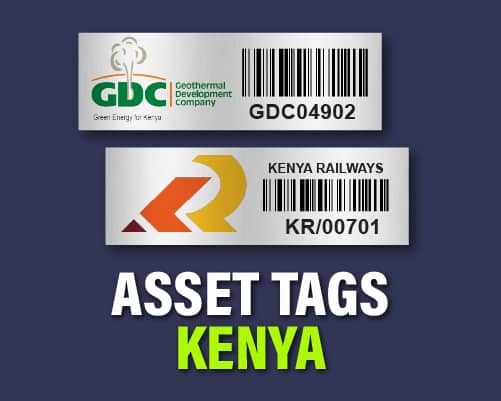
QR codes, short for Quick Response codes, are two-dimensional barcodes capable of storing detailed information. Unlike traditional barcodes, QR codes can hold asset IDs, URLs, maintenance logs, and even multimedia data. When embedded onto aluminium tags, they become a durable, scannable gateway to critical asset information.
Aluminium is the gold standard for durability. QR Code Aluminium Asset Tags in Kenya are built to withstand extreme environments, from industrial heat to chemical exposure. Unlike paper or plastic alternatives, aluminium tags remain readable and functional for years—guaranteeing a long-term asset identification solution.
Aluminium asset tags can be customized with your company’s branding, serial numbers, or additional data, and they firmly adhere to surfaces like machinery, electronics, tools, or infrastructure—ensuring consistent visibility and easy scanning.
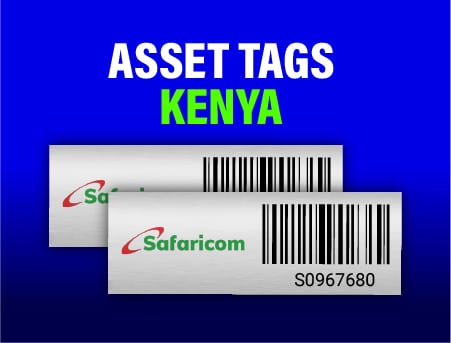
QR Code Aluminium Asset Tags in Kenya are reshaping how organizations manage assets. By combining durable aluminium materials with the intelligence of QR codes, these tags offer a resilient and modern solution for tracking, maintaining, and optimizing your physical assets.
From streamlined identification and mobile access to data-rich analytics and reduced maintenance downtime, the benefits are tangible. Embrace the future of asset management. Harness the full potential of QR Code Aluminium Asset Tags in Kenya to take control, gain insights, and operate with confidence.
- High durability for long-term use in tough environments
- Accurate asset tracking with instant QR code scanning
- Efficient field operations with mobile compatibility
- Better planning through insightful scan-based analytics
- Reduced errors and faster auditing processes
- Lower operational costs through improved workflows
By implementing QR Code Aluminium Asset Tags in Kenya, organizations gain a competitive edge in efficiency and compliance. From hospitals managing medical devices to manufacturers tracking tools or NGOs auditing distributed equipment, these tags simplify asset control, reduce overheads, and enhance transparency.
Contact us For – Quality Solutions For Your Business, At Affordable Prices. Work with us today! The best Asset Tagging provider in Nairobi, Kenya, Africa. Contact Us to Elevate your business with our professional solutions. We provide the best Asset Tagging, Asset Tag Labels Printing and Asset Management Software Solutions in Nairobi, Kenya, Africa. Welcome!
QR Code Asset Tags in Kenya (FAQs)
What are Aluminium Asset Tags with QR Code in Kenya used for?
Aluminium Asset Tags with QR Code in Kenya are used for tracking and managing physical assets such as machinery, IT equipment, tools, furniture, and inventory. The QR codes store essential asset data, while the aluminium material ensures long-term durability in harsh environments.
Why should I choose aluminium tags over plastic or paper ones?
Aluminium asset tags are highly durable, weather-resistant, and long-lasting. Unlike paper or plastic tags, QR Code Aluminium Asset Tags in Kenya can withstand heat, chemicals, abrasion, and outdoor conditions—making them ideal for industrial and commercial use.
How does scanning the QR code help with asset management?
When a QR code aluminium asset tag is scanned using a smartphone or tablet, it instantly displays stored asset information such as serial number, maintenance history, location, and owner details. This improves speed, accuracy, and real-time access to asset data.
Can QR Code Aluminium Asset Tags be customized with our company logo?
Yes, QR Code Aluminium Asset Tags in Kenya can be fully customized. We offer options to include your company logo, branding, serial numbers, color coding, or even dual-language text, depending on your asset tagging requirements.
What industries benefit most from QR Code Asset Tags in Kenya?
The Aluminium Asset tags are perfect for use in manufacturing, construction, education, healthcare, logistics, NGOs, and government sectors—anywhere assets need to be tracked, maintained, and verified regularly.
Do I need special software to use QR Code Aluminium Asset Tags?
No special software is required to scan the tags—any smartphone or tablet with a QR code scanner can read them. However, for advanced features like real-time updates or integration with asset management systems, we offer compatible software solutions upon request.
How long do QR Code Aluminium Asset Tags last?
When properly applied, QR Code Aluminium Asset Tags in Kenya can last 5–10 years or more, even in challenging environments. Their resistance to wear and tear ensures readability throughout the asset’s lifecycle.
Can I link the QR code to an online asset register or cloud database?
Absolutely. QR Code Aluminium Asset Tags in Kenya can be encoded with URLs or dynamic QR codes that link directly to cloud-based asset registers, maintenance logs, or equipment databases for real-time updates and remote access.


